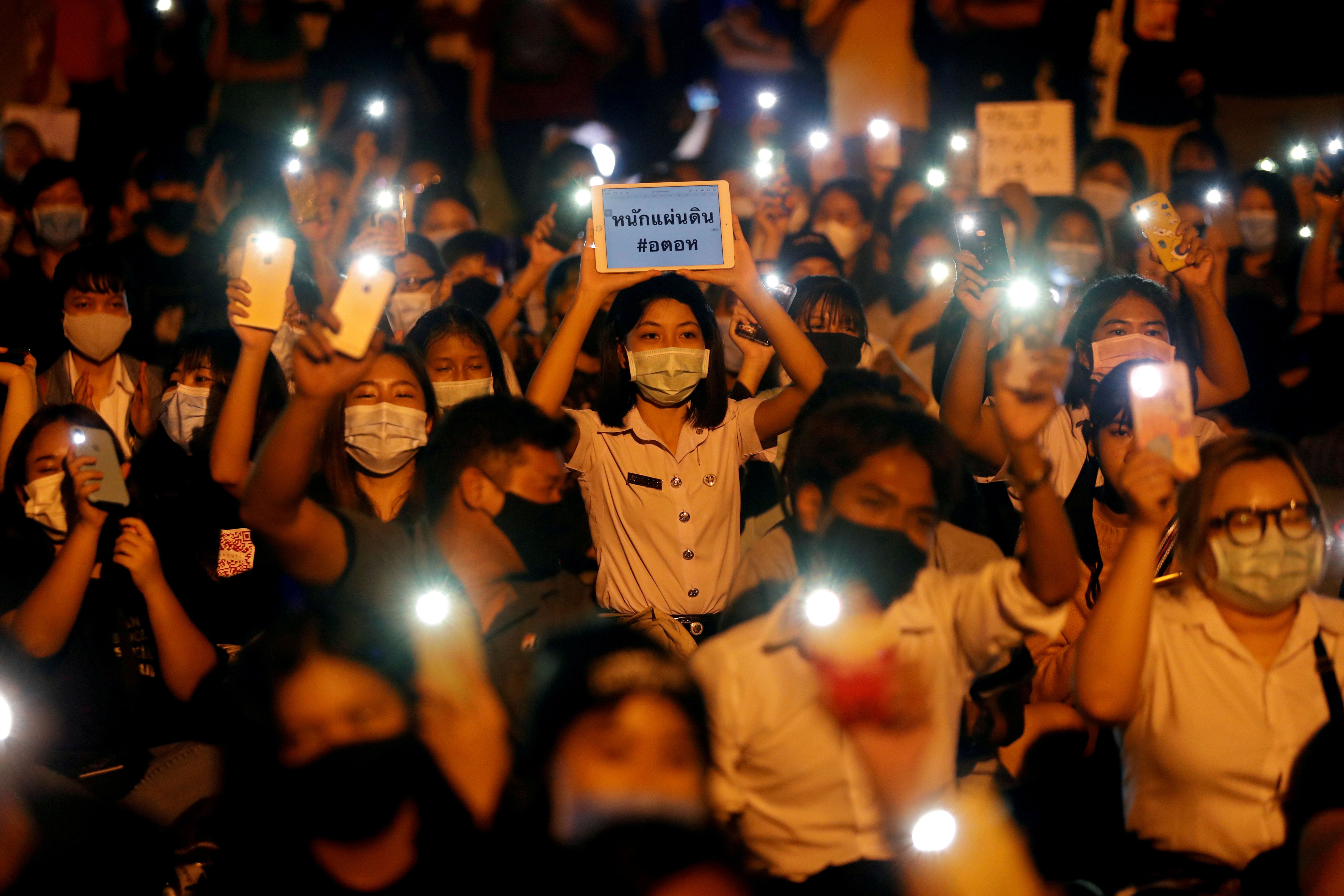July 29, 2020
Thousands of young people have taken to Thailand's streets in recent weeks to raise their voices against an increasingly unpopular government. Angry protests are a dime a dozen in the Land of Smiles, so why is this movement different?
First, the protestors are defying strict social-distancing rules under an ongoing nationwide state of emergency to prevent the spread of the coronavirus. Second, they are facing off against the powerful Thai military, which seized power following a 2014 coup and rewrote the country's constitution to win a parliamentary majority following a carefully stage-managed election in 2019. The political dominance of the generals is now deeply entrenched.
Third, this youth movement is the first in a generation that has no ties to either the ultra-royalist, military-backed "yellow shirts" or the populist "red shirt" supporters of Thaksin Shinawatra, the exiled former prime minister deposed by a previous coup in 2006.
But most importantly, these protestors are breaking a taboo that will horrify many older Thais by (indirectly) questioning the authority of the King. It's is a game-changer for Thai politics — an assault on an institution that has remained the only national symbol of continuity and stability since 1932.
For this movement, the only way to restore Thailand's democracy and bring transformative change is to oust the entire existing power structure.
These activists are staging their protests in new ways. They mobilize via social media to organize flash mobs. When security forces gather to oppose them, they flash a three-finger salute of youth resistance popularized by the Hunger Games book and movie franchise.
The protesters have three demands. First, they want to scrap the constitution that has allowed the generals to manipulate the electoral system, for instance by disbanding the progressive Future Forward Party for accepting a loan from its own founder to finance the 2019 campaign. Although the party finished third in the vote, it was then barred from entering an anti-military coalition government by a creative interpretation of electoral law and the intervention of the Senate (which is entirely appointed by the military).
Second, they want the resignation of Prayuth Chan-ocha, the 2014 coup leader who decided to stay on as prime minister. And third, the military must stop going after peaceful pro-democracy activists, one of whom recently turned up dead in Cambodia.
The movement is also focused on the future of young people in Thailand, where the economy is expected to shrink by more than 8 percent this year due to the impact of COVID-19 on the tourism industry.
Warnings that they have nothing to lose have even emboldened the protestors to target the (until now untouchable) monarchy. At rallies, demonstrators have waved signs calling to "abolish 112," the section in the Thai criminal code that punishes with 3 to 15 years behind bars any offense to the royal family. It's a painful indictment of King Vajiralongkorn… only four years after he succeeded his father, the much more widely revered King Adulyadej.
The former monarch was loved by most Thais, in part because he sometimes intervened in times of political unrest to ease tensions. The new King's unpopularity, heightened by news that he spent the coronavirus lockdown at a luxury resort in Germany, leaves him deeply dependent on the military (which explains why he forbade his own sister, Princess Ubolratana, from running for prime minister against Prayuth in 2019).
Change is not on the horizon. Not yet, at least. The military and monarch have more than enough muscle to beat back protests. But the willingness of members of this movement to cross lines that have never been crossed before signals a generational transition that could upend Thailand's power structure in years to come.More For You
An employee works on the beverage production line to meet the Spring Festival market demand at Leyuan Health Technology (Huzhou) Co., Ltd. on January 27, 2026 in Huzhou, Zhejiang Province of China.
Photo by Wang Shucheng/VCG
For China, hitting its annual growth target is as much a political victory as an economic one. It is proof that Beijing can weather slowing global demand, a slumping housing sector, and mounting pressure from Washington.
Most Popular
Two Iranian motorcyclists stop in front of the burned East Tehran General Directorate of Tax Affairs headquarters in Tehran, Iran, on January 21, 2026.
Photo by Morteza Nikoubazl/NurPhoto
30,000: The estimated death toll in Iran during the protests at the start of the year, per local health officials, underscoring the scale of the Islamic Republic’s crackdown on its own citizens.
The World Health Organization (WHO) headquarters is seen in Geneva, Switzerland, January 28, 2025.
REUTERS/Denis Balibouse
Seventy-eight years after helping found the World Health Organization (WHO), the United States has formally withdrawn from the agency, following through on a pledge President Donald Trump made on his first day back in office.
Mastercard Economic Institute's Outlook 2026 explores the forces redefining global business. Tariffs, technology, and transformation define an adaptive economy for the year ahead. Expect moderate growth amid easing inflation, evolving fiscal policies, and rapid AI adoption, driving productivity. Digital transformation for SMEs and shifts in trade and consumer behavior will shape strategies worldwide. Stay ahead with insights to help navigate complexity and seize emerging opportunities. Learn more here.
© 2025 GZERO Media. All Rights Reserved | A Eurasia Group media company.
